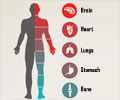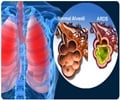Stress and emotions can change the composition of the gut microbiome. Research discovered role of the gut microbiome in post-traumatic stress disorder (PTSD)

TOP INSIGHT
Stress hormones can affect bacterial growth and compromise the integrity of the intestinal lining, which can result in bacteria and toxins entering the bloodstream causing inflammation.
In turn, stress and emotions can change the composition of the gut microbiome. Stress hormones can affect bacterial growth and compromise the integrity of the intestinal lining, which can result in bacteria and toxins entering the bloodstream. This can cause inflammation, which has been shown to play a role in several psychiatric disorders.
"Our study compared the gut microbiomes of individuals with PTSD to that of people who also experienced significant trauma, but did not develop PTSD (trauma-exposed controls). We identified a combination of three bacteria (Actinobacteria, Lentisphaerae and Verrucomicrobia) that were different in people with PTSD," explains the lead researcher, Dr Stefanie Malan-Muller. She is a postdoctoral fellow in the Department of Psychiatry at the Faculty of Medicine and Health Sciences.
Individuals with PTSD had significantly lower levels of this trio of bacteria compared to trauma-exposed control groups. Individuals who experienced trauma during their childhood also had lower levels of two of these bacteria (Actinobacteria and Verrucomicrobia). "What makes this finding interesting, is that individuals who experience childhood trauma are at higher risk of developing PTSD later in life, and these changes in the gut microbiome possibly occurred early in life in response to childhood trauma," says Malan-Muller. She collaborated with researchers from the University of Colorado Boulder on the study.
One of the known functions of these bacteria is immune system regulation, and researchers have noted increased levels of inflammation and altered immune regulation in individuals with PTSD. "Changes in immune regulation and increased inflammation also impact the brain, brain functioning and behavior. Levels of inflammatory markers measured in individuals shortly after a traumatic event, was shown to predict later development of PTSD.
However, researchers are unable to determine whether this bacterial deficit contributed to PTSD susceptibility, or whether it occurred as a consequence of PTSD.
Source-Eurekalert
 MEDINDIA
MEDINDIA




 Email
Email










